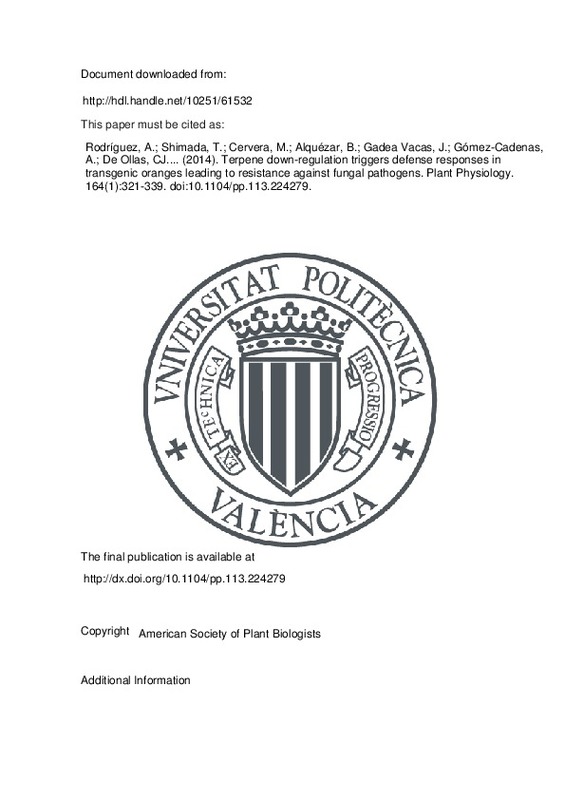Rodríguez, A.; Shimada, T.; Cervera, M.; Alquézar, B.; Gadea Vacas, J.; Gómez-Cadenas, A.; De Ollas, CJ.... (2014). Terpene down-regulation triggers defense responses in transgenic oranges leading to resistance against fungal pathogens. Plant Physiology. 164(1):321-339. https://doi.org/10.1104/pp.113.224279
Por favor, use este identificador para citar o enlazar este ítem: http://hdl.handle.net/10251/61532
|
Título:
|
Terpene down-regulation triggers defense responses in transgenic oranges leading to resistance against fungal pathogens
|
|
Autor:
|
Rodríguez, Ana
Shimada, Takehiko
Cervera, Magdalena

 Alquézar, Berta
Alquézar, Berta

 Gadea Vacas, José
Gómez-Cadenas, Aurelio
De Ollas, Carlos José
Rodrigo, María Jesús
Zacarías, Lorenzo
Gadea Vacas, José
Gómez-Cadenas, Aurelio
De Ollas, Carlos José
Rodrigo, María Jesús
Zacarías, Lorenzo
 PEÑA GARCIA, LEANDRO
PEÑA GARCIA, LEANDRO
|
|
Entidad UPV:
|
Universitat Politècnica de València. Departamento de Biotecnología - Departament de Biotecnologia
Universitat Politècnica de València. Instituto Universitario Mixto de Biología Molecular y Celular de Plantas - Institut Universitari Mixt de Biologia Molecular i Cel·lular de Plantes
|
|
Fecha difusión:
|
|
|
Resumen:
|
Terpenoid volatiles are isoprene compounds that are emitted by plants to communicate with the environment. In addition to their function in repelling herbivores and attracting carnivorous predators in green tissues, the ...[+]
Terpenoid volatiles are isoprene compounds that are emitted by plants to communicate with the environment. In addition to their function in repelling herbivores and attracting carnivorous predators in green tissues, the presumed primary function of terpenoid volatiles released from mature fruits is the attraction of seed-dispersing animals. Mature oranges (Citrus sinensis) primarily accumulate terpenes in peel oil glands, with D-limonene accounting for approximately 97% of the total volatile terpenes. In a previous report, we showed that down-regulation of a D-limonene synthase gene alters monoterpene levels in orange antisense (AS) fruits, leading to resistance against Penicillium digitatum infection. A global gene expression analysis of AS versus empty vector (EV) transgenic fruits revealed that the down-regulation of D-limonene up-regulated genes involved in the innate immune response. Basal levels of jasmonic acid were substantially higher in the EV compared with AS oranges. Upon fungal challenge, salicylic acid levels were triggered in EV samples, while jasmonic acid metabolism and signaling were drastically increased in AS orange peels. In nature, D-limonene levels increase in orange fruit once the seeds are fully viable. The inverse correlation between the increase in D-limonene content and the decrease in the defense response suggests that D-limonene promotes infection by microorganisms that are likely involved in facilitating access to the pulp for seed-dispersing frugivores.
[-]
|
|
Palabras clave:
|
Lipid transfer protein
,
Jasmonic acid biosynthesis
,
Arabidopsis mutant CEV1
,
Induced plant defenses
,
Signal transduction
,
Penicillium digitatum
,
Transcription factor
,
Gene-expression
,
Innate immunity
,
Insect attack
|
|
Derechos de uso:
|
Reserva de todos los derechos
|
|
Fuente:
|
Plant Physiology. (issn:
0032-0889
) (eissn:
1532-2548
)
|
|
DOI:
|
10.1104/pp.113.224279
|
|
Editorial:
|
American Society of Plant Biologists
|
|
Versión del editor:
|
http://dx.doi.org/10.1104/pp.113.224279
|
|
Código del Proyecto:
|
info:eu-repo/grantAgreement/MICINN//AGL2009-08052/ES/Mejora Genetica De La Calidad Y De La Respuesta A Estreses Bioticos De Los Citricos Mediante Ingenieria Genetica/
|
|
Agradecimientos:
|
This work was supported by the Fondo Europeo de Desarrollo Regional and the Ministry of Science and Innovation of Spain (grant no. AGL2009-08052), by the Fundo de Defesa da Citricultura, and by the Instituto Valenciano de ...[+]
This work was supported by the Fondo Europeo de Desarrollo Regional and the Ministry of Science and Innovation of Spain (grant no. AGL2009-08052), by the Fundo de Defesa da Citricultura, and by the Instituto Valenciano de Investigaciones Agrarias, Spain (Ph.D. fellowship to A.R.).
[-]
|
|
Tipo:
|
Artículo
|







![[Cerrado]](/themes/UPV/images/candado.png)


